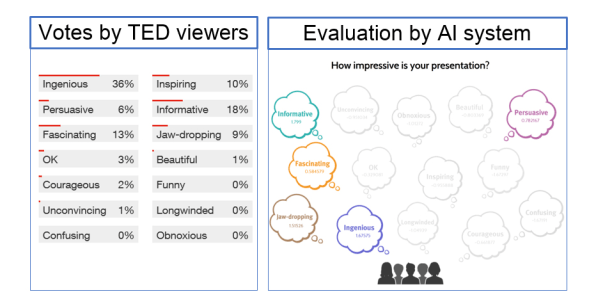Tools Automated Pv Solar Design Ai
Recently I was told that a TEDx talk I gave was inspiring, courageous, beautiful, funny, but a little unconvincing. Good feedback overall, I thought. But what was most memorable about that review was that it didn't come from a human.
In his lab at the University of Tokyo, professor Toshihiko Yamasaki has developed a machine-learning system that runs sentiment analysis on a presenter's words, voice, and tone. It then gives feedback by scoring the presentation against a database of how viewers have rated videos on TED.com. My speech was evaluated against the TED Talk archive, according to 14 separate categories Yamasaki has pinpointed, including how "courageous," "long-winded," and "jaw-dropping" it was.
Yamasaki originally developed the system to give speakers an opportunity to receive objective feedback in order to improve their delivery. Though he admits he may have had a personal motive, too. "I thought it would be great if AI could train new students for me," he explained. Yamasaki's goal is to ultimately make the system operate in real time, giving a speaker instant sentiment-analysis on how they sound over the course of a presentation.

But his platform is just one of a handful of machine-learning and artificial intelligence (AI) systems that are working toward that objective. In fact, there's a quiet revolution going on in the world of presentations and public speaking, and if it succeeds, it may be no time before we're all planning, designing, and fine-tuning our presentations with help from AI.
PowerPoint On Demand
Presentation feedback probably won't just come after you've already delivered a dry run, either. After all, wouldn't it be great to feed a rough outline of tomorrow's sales presentation into an AI-driven platform and have it create the slides for you? Several startups are already working on this, using technology to replicate the expertise of a human designer and build more compelling slide decks.
I've tried out cloud-based AI systems like Zuru, from Haiku Deck, and SlideBot. Both take an existing PowerPoint file, then deploy different forms of AI to pull out key messages. Then they populate the slides with images they search for based on slide keywords, and automatically apply design rules to format them.
In my experience, the one thing that was consistent between the two platforms was their inconsistent results. One slide may get my message across beautifully, pulling correctly from the keywords in my presentation–great formatting, perfectly chosen images–and the next slide will be an ugly bullet-pointed list or a frighteningly inappropriate image.
They also share an aesthetic. The slides Zuru and SlideBot churn out tend to be of the "Presentation Zen" style–big fonts, minimal text, full-bleed photos as backgrounds. They also tend to have a certain sameness; visual variety isn't these tools' strongest suit. What's more, charts and tables need to be created manually in both platforms, and formatting options are limited. Fortunately, both Zuru and SlideBot allow you to export and download the slides for further editing.
But while machine-learning slide design may still be in its infancy, it's clear where the technology is heading. In the meantime, the best use of these applications is to create individual slides rather than full decks. They do a reasonable job of picking images and producing passable slides in seconds or minutes. Human intervention is still necessary, but both already save a lot of time on what's often a tedious process.
How The AI Race Might Reshape Presentation Tech
However, I've seen some AI-backed presentation tools improve even within the space of a few months. After all, they're supposed to. By definition, machine-learning platforms learn: the more often you use them, the better they get at their tasks. So the more a human user manually tweaks the slides that an AI tool spits out, the less they'll need to over time. The core AI and feature set are getting better, too. A new release of Zuru is imminent, which will be able to create slides from text documents or Wikipedia articles.
We're still in the early days of this technology. Haiku Deck has been around since 2010, but Zuru was born only in 2015, as was SlideBot. New startups are coming into this space, getting modest financing of a few millions of dollars apiece. But they all share a similar goal: to carve a space out of the enterprise productivity market, which has been forecast to clock in at some $58 billion by the end of this year. Whether smaller players focused just on the presentation niche can compete with AI heavyweights like Microsoft, Amazon, Apple, Google, and IBM is an open question, but so far, they're holding their own. Microsoft only recently added design automation features to PowerPoint, for instance, and so far it's quite limited.
On the other hand, it may be only a matter of time before Google hooks up Assistant to Slides, Apple connects Siri to Keynote, or Microsoft links Cortana to PowerPoint. Speak to it and tell it what you want your slides to look like, and the AI will create it for you. The race is already on, and the competition is tightening.
Adam Tratt, CEO and cofounder of Haiku Deck, says the actual technology to make these integrations already exists. "It's just a question of who puts the pieces together in a way that's elegant and transformational such that it feels like magic." Bringing users that magic will be a huge service, whoever does it first. If the all-too-familiar death-by-PowerPoint experience so many of us suffer is finally headed to a grave of its own, it may be a machine that puts it there.
Darren Menabney lives in Tokyo, where he leads global employee engagement at Ricoh, teaches MBA students at GLOBIS University, coaches online for IDEO U, and supports the Japanese startup scene. Follow him on Twitter at @darmenab.
Tools Automated Pv Solar Design Ai
Source: https://www.fastcompany.com/3064951/can-these-ai-powered-tools-help-you-perfect-your-next-presentation
Posted by: andersonpromple.blogspot.com

0 Response to "Tools Automated Pv Solar Design Ai"
Post a Comment